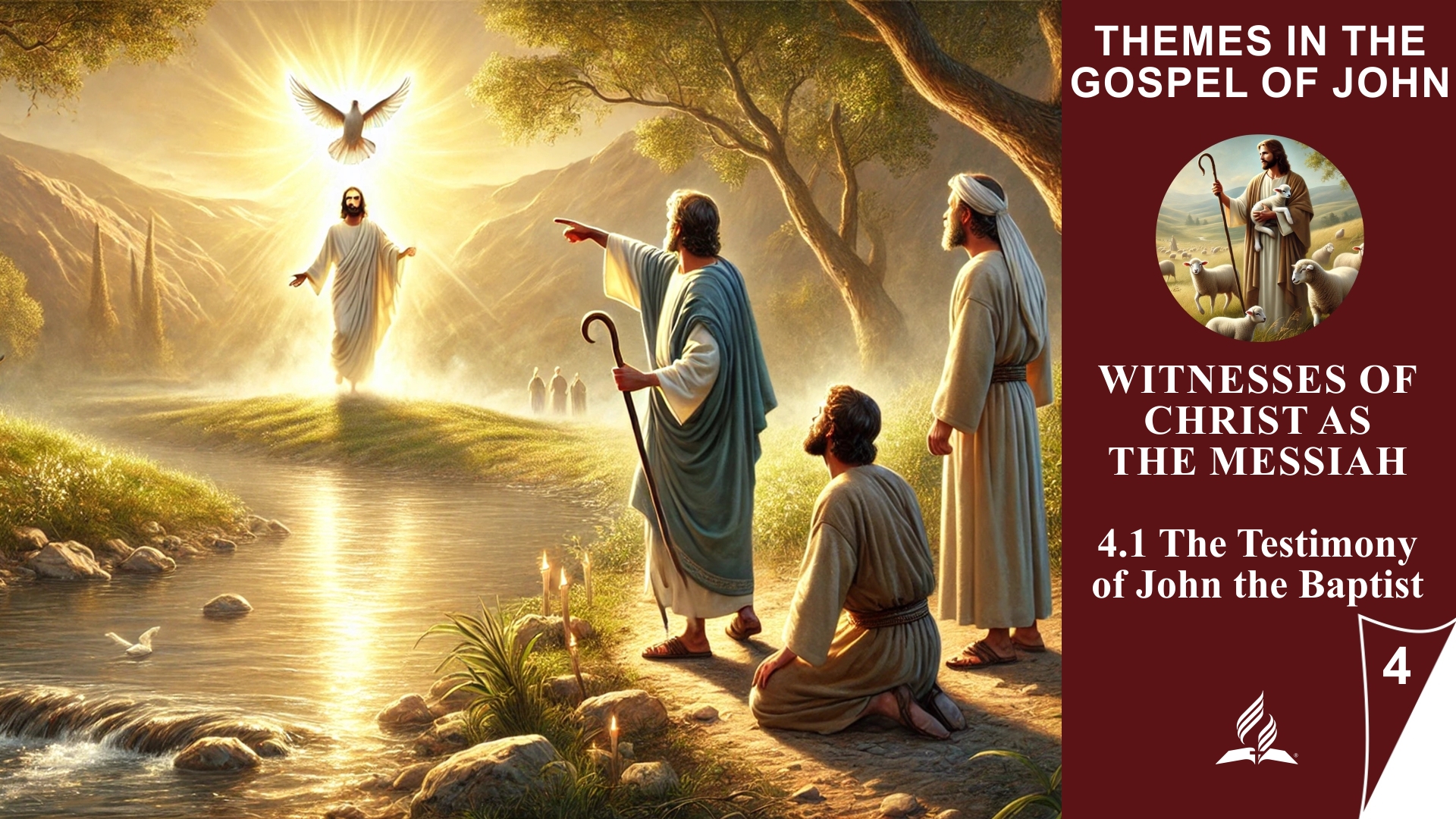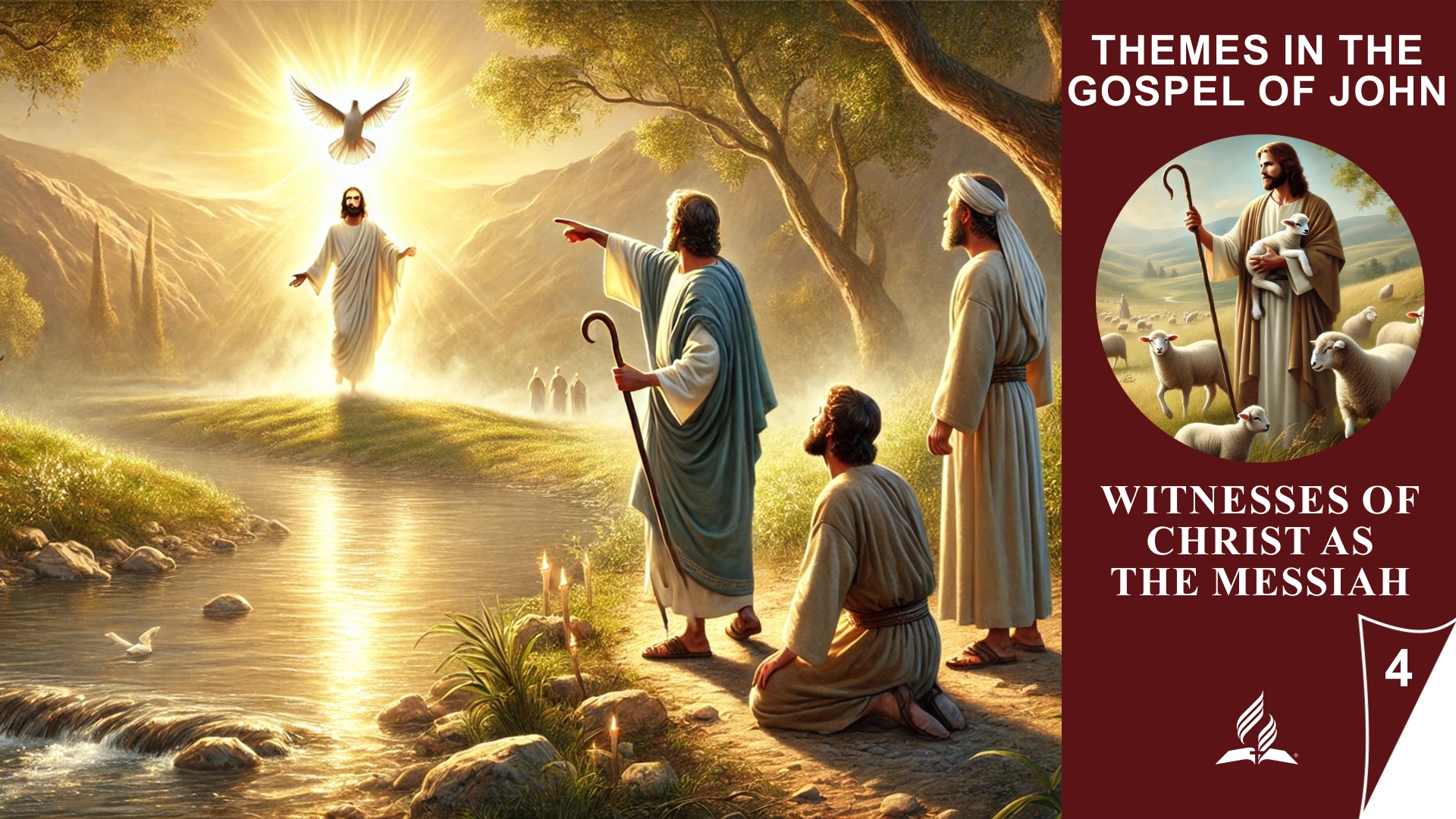


Lesson 4.Witnesses of Christ as the Messiah
Jesus Christ – The True Messiah
Lesson 4 focuses on the diverse and significant testimonies that point to Jesus Christ as the promised Messiah. In the Gospel of John, we encounter individuals such as John the Baptist and the first disciples, who recognize Jesus as the Savior and point to Him. This lesson demonstrates how Jesus did not fulfill the political expectations of a Messiah but instead took on the crucial role of redeeming humanity through His sacrifice. The various testimonies we examine in this lesson emphasize Jesus’ identity as the “Lamb of God” and His fulfillment of Old Testament prophecies. They invite us to accept Jesus as the true Savior, just as the witnesses of His time did.
4.1 The Testimony of John the Baptist
John the Baptist: A Witness to the True Messiah
Read John 1:19–23. How did John the Baptist explain his ministry and mission?
John the Baptist plays a crucial role in the Gospel of John as the first witness to the Messiah. As the study guide highlights, John clearly states that he is not the Messiah himself but merely the forerunner preparing the people for the coming of Jesus. This was especially important in a time when expectations for the Messiah were varied and strong. Some Jews even expected two different Messiahs—a kingly one and a priestly one. John rejects such ideas and focuses entirely on Jesus Christ, the true Messiah.
Clarifying His Identity
In John 1:19–23, John the Baptist is questioned by the religious leaders about who he is. In the face of messianic expectations, he makes it clear: “I am not the Christ.” He does not present himself as the expected Savior but as “the voice of one crying out in the wilderness,” quoting Isaiah 40:3. This humble stance shows that John understood his role clearly: He was not the light but was sent to bear witness to the light—Jesus Christ—and to prepare the people for Him.
The Testimony About the Greater One
John further clarifies that his baptism with water was only a symbolic preparation for the far greater work of Christ, who would baptize with the Holy Spirit (John 1:26–33). He emphasizes that he is not even worthy to untie the straps of the coming Messiah’s sandals—a sign of deep humility and awareness of Jesus’ immense greatness.
The Difference Between John and Jesus
John also highlights the preeminence of Jesus by saying that Christ “was before him” (John 1:30). This refers to Jesus’ eternal existence, as described in the prologue of the Gospel of John. Although John the Baptist began his public ministry before Jesus, he emphasizes that Jesus, who has existed for all eternity, is infinitely greater.
The Mission of the Testimony
John’s role as a witness was to point to the true Son of God (John 1:34). He recognized in Jesus not just another prophet but the one who had come as the “Lamb of God” to take away the sins of the world (John 1:29). John the Baptist saw himself as a servant of this truth, with his entire mission focused on Jesus.
Relevance for Today
John the Baptist’s testimony carries a message for believers today. His clarity about his identity and mission, along with his humility toward Christ, serves as an example. John shows us that our task is to point to Jesus and not to ourselves. His ministry reminds us that the true focus should be on Christ, the sole Savior and fulfillment of God’s promises.
John the Baptist was not the Messiah, but he was the faithful witness who pointed people to the true Messiah. His humility and dedication to the divine mission make him a model for all who seek to live according to Christ’s example.
Read Isaiah 40:1–5 and John 1:23. How does John use these verses?
John the Baptist plays a central role in fulfilling the prophecy of Isaiah 40:1–5. This prophecy speaks of a messenger who “cries out in the wilderness” and prepares the way for the Lord. John quotes this passage in John 1:23 to explain his own mission: He is not the Messiah but the one sent to prepare people for the coming of the Messiah.
Preparation of the Way
In ancient times, when roads were rough and filled with obstacles, servants were sometimes sent ahead of the king to smooth the roads and remove sharp turns to make the king’s journey easier. John the Baptist fulfilled a similar spiritual role. He came to prepare people’s hearts for Jesus by calling them to repentance and aligning their lives with the coming of the King of Kings, Jesus Christ.
The Call to Repentance
Isaiah 40:1–5 describes not only the physical preparation of a road but also the spiritual preparation necessary for people to receive the Messiah. John the Baptist preached a message of repentance and renewal to free people’s hearts from pride, sin, and hardness. Just as the roads were made smooth for a king, so people were to humble their hearts and change their ways in preparation for the coming of Jesus.
Fulfillment of Prophecy
By quoting Isaiah 40:1–5, John positions himself as the forerunner of Jesus, as foretold in the prophecy. This demonstrates the continuity between the Old Testament and Jesus’ ministry. John was the one who marked the transition between the old order and the new covenant in Christ. He called people to repentance and to a new spiritual life, preparing them for the radical renewal that Jesus would bring.
The Significance for Us Today
The message of John, based on Isaiah 40, remains relevant today. Preparing the way for Jesus Christ is a task we must continue in our own lives and in the world around us. It involves preparing our hearts for God’s work, removing the obstacles of pride or sin, and humbly receiving what God wants to do in our lives. Just as John the Baptist prepared people for the first coming of Christ, we are called today to prepare ourselves and others for His second coming.
Conclusion
John the Baptist uses Isaiah 40:1–5 to clarify his role as the preparer of the Messiah’s way. As the prophecy describes, he paves the way not through physical labor but through preaching repentance and bearing witness to Jesus Christ. His mission reminds us that true spiritual renewal begins with preparing our hearts for God’s work.
In what ways should we, as Seventh-day Adventists, carry out the same type of ministry as John the Baptist? What parallels exist?
As Seventh-day Adventists, we see ourselves in many ways in a similar role to John the Baptist, who announced the first coming of Jesus Christ and prepared the people for the Messiah. Our ministry is focused on preparing the world for Christ’s second coming. There are clear parallels between the ministry of John the Baptist and what we as Adventists are called to do today.
-
Message of Repentance and Renewal
John the Baptist preached a clear message of repentance, calling people to turn from their sins and prepare spiritually for the coming of the Messiah. As Adventists, we are also called to summon people to a spiritual awakening. Our message emphasizes the need for personal and communal repentance, as only through this transformation of the heart can true preparation for Christ’s return be achieved.
-
Preparation for the Coming of the Messiah
John was a forerunner who prepared the way for Jesus’ first coming. As Adventists, we proclaim the soon return of Christ. Just like John, we call people to prepare spiritually because Jesus is coming soon. Our ministry involves pointing people to the second coming of the Lord and helping them be ready through Bible study, prayer, and a life of faith.
-
A Life of Simplicity and Dedication
John the Baptist led a simple, ascetic life, prioritizing spiritual things above all else. We, too, are called to lead lives of simplicity and dedication to God in a world often consumed by excess and self-interest. This lifestyle is a powerful testimony to the values of God’s coming kingdom and reflects the importance of a spiritually focused life.
-
Testimony About Jesus as the Lamb of God
John the Baptist pointed to Jesus and identified Him as the “Lamb of God who takes away the sin of the world” (John 1:29). Our mission as Adventists is also to point to Jesus—not only as the Savior of the world but also as our High Priest in the heavenly sanctuary and the soon-coming King. The core of our testimony is Jesus Christ: His work of salvation, His current ministry in heaven, and His second coming.
-
A Call to Spiritual Vigilance
John called people to be vigilant so they would not miss the coming of the Messiah. As Adventists, we warn against spiritual complacency and urge people to be watchful and ready. The “Three Angels’ Messages” (Revelation 14) emphasize the urgency of preparing for the end times and call for faithfulness to God’s commandments and faith in Jesus.
-
Unwavering Faith and Courage
John the Baptist stood boldly for the truth, even when he was rejected by the religious and political leaders of his time. As Adventists, we are also called to steadfastly proclaim the truth, even when it goes against the prevailing culture or faces opposition. John’s courage to openly speak the truth inspires us to continue sharing the message of salvation and Christ’s return, even in difficult times.
Conclusion:
As Seventh-day Adventists, we should carry out the ministry of preparation and testimony, much like John the Baptist did. Our task is to prepare the world for the second coming of Christ by calling for repentance, pointing to Jesus as the Savior, and living a life of simplicity and dedication. The parallels between John’s ministry and our mission today show that we act as forerunners of Christ’s return, pointing to the imminent end and calling for spiritual vigilance.
As Seventh-day Adventists, we can draw valuable lessons for our daily lives and faith from the testimony of John the Baptist. John lived with a clear focus on his mission: to prepare people for the coming of Jesus. This task is also relevant for us, as we are called to prepare the world for Christ’s second coming.
-
Humility and Clarity in Our Calling
John showed deep humility by clearly distinguishing his role from that of Jesus. We too should be aware that our task is to point to Jesus and not to ourselves. Our lives should be a testimony that leads others to Christ.
-
Call to Repentance
John called people to repentance and to prepare their hearts for the Messiah. This message remains relevant today. In our daily lives, we should strive to live our faith authentically, encourage others to repent, and point them to the spiritual renewal that is only possible through Christ.
-
Vigilance and Preparation
Just as John pointed to the first coming of Jesus, we are also called to prepare people for the second coming of Christ. This spiritual vigilance should shape our daily lives, as we recognize the signs of the times and help our fellow humans to be aware of God’s plan.
Overall, John’s testimony reminds us that our faith is not only important for ourselves, but that we also have a responsibility to bear witness to the light of Jesus Christ in the world and to help prepare others for His return.
Prepare your heart daily as if Christ’s return is near, and live with hope and dedication.
Visited 67 times, 1 visit(s) today









